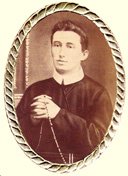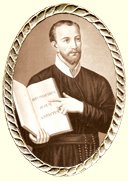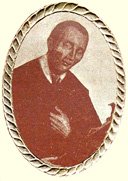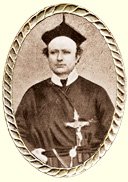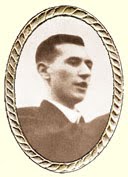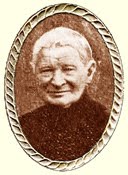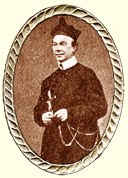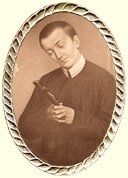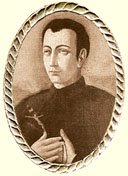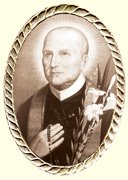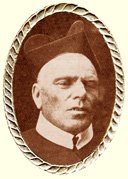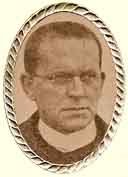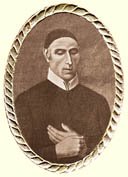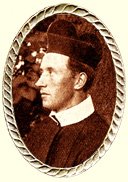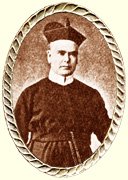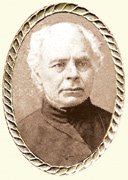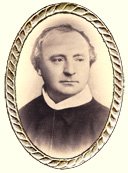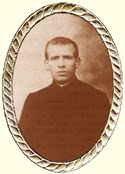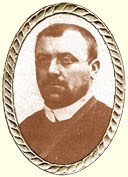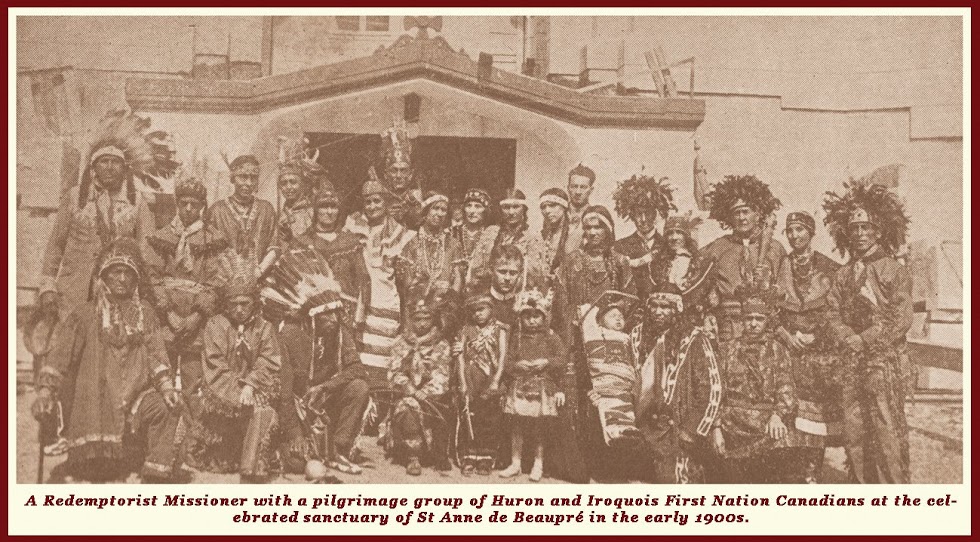Bl. Januarius Maria Sarnelli, C.SS.R. (1702-1744)
Father Don Januarius Maria Sarnelli was born at Naples, on the 12th September 1702. His parents were D. Angelus Sarnelli, baron of Ciorani and D. Catherine Scoppa. They had eight children, of whom, six were boys and two were girls. D. Januarius was their fourth son. D. Andrew, who was next to him in age, is that secular priest who set on foot at his own expense, a house of missionaries in the territory of Ciorani, who were instituted that they might go about in the diocese of Salerno, and in the neighbourhood, labouring for the salvation of the destitute souls in the country.
Don Januarius manifested most pious dispositions from his very infancy; and he was even then remarkable for his angelic modesty, which caused him always to keep his eyes cast down in presence of women, even that of his sisters and mother. His obedience and submission to his parents were equally exemplary, and when he perceived that he had at all annoyed them, he used instantly to beg for forgiveness, and would kiss their hand or even throw himself at their feet in order to appease them. He evinced the greatest love of mortification from his earliest youth, and even then always abstained from fresh fruit from a spirit of penance. When his parents gave any entertainment, he used instantly to leave the house and go to the Church of St Francis Xavier, which was just opposite to where they lived. In a word, from all we know regarding his childhood and the whole course of his life, it is easy to infer that he never lost his baptismal innocence.
When he was fourteen, he earnestly begged his father to allow him to leave the world and to enter into the Society of Jesus, but as he was so young he would not permit him to do so. From this time, however, D. Januarius redoubled his fervour in the service of God; he increased the number of his mediations, and led still a more retired life than before. He never conversed with those of his own age, but after he had gone through his studies, his love of solitude caused him to retire into the church, to pray to God before the Blessed Sacrament to enlighten him as to his vocation. After that he would return home, where his conduct towards his parents was a source of great edification to the whole household. At an after period, he embraced the profession of the law in obedience to his father, and he succeeded in it in a wonderful manner. Although he was still very young, the management of the revenues and of the rents of the Duke of Cirifalco were soon entrusted to him. But amid these different occupations, he never omitted to assist at Mass every day, or to make his visit to the Blessed Sacrament and his daily meditation, and he had such affection for this exercise, that when he was at liberty he used always to go to the Church of St Francis Xavier, where he would remain in prayer for such a long time, that when any one came to speak to him and he was not at home, the servants, who knew his custom, used generally to reply, “You will be sure to find him if you go to the Church of St Francis Xavier.” When he went to his father’s estate, the only recreation he took was that of shutting himself up in the parish church, where he would spend half the day in mediation. This was asserted by the Priest of the place.
He used also to visit the sick in the hospital of the incurables several times a week, and he said that he received such great lights from God when he was there, that these visits gave him constant food for mediation, and he came away full of consolation, and replenished with the spirit of God. It was also in this place that God made known to him that he was called by Him to leave the world. After consulting with his director on the subject, he immediately resolved to do so, quitting the bar and becoming a Priest. As soon as he was ordained he gave up all earthly possessions; he distributed all the money he had lain by amongst the poor, as well as the clothes he had worn in the world. He gave himself up unreservedly to God from this time, and spent all his time in prayer, study, and the assistance of his neighbour.
In order to live in still greater solitude, and to give up all connection with the world, he retired into the Congregation of the Holy Family, or, in other words, into the Chinese College, which was established at Naples. During all the time he stayed among these exemplary priests, his constant occupation was either mediation and study, or else going about the neighborhood teaching the Christine doctrine; he also went several times a week to the hospital, where he would spend as many as six hours consecutively, in teaching, consoling, and attending the poor patients.
About this time he become a member of the Congregation of Apostolical Missions, which was set on foot in the Archbishopric of Naples for missionary purposes, in which he labored in a most exemplary and efficacious manner from the moment he entered the priesthood. Some years afterwards he heard that a congregation of missionary priests had been recently formed in the town of Scala, under the direction of Mgr. Falcoja, the Bishop of Castellamara, and that they were to devote their time to the service of the destitute country poor, be means of missions and other spiritual exercises; and as he heard that regular observance of rule was strictly attended to among them, and that besides the simple vows of poverty and obedience, a fourth vow and oath of perseverance was taken by its members, he felt a great desire to enter it. In order therefore to satisfy his desire to lead a life of greater perfection, and one in which he would be entirely consecrated to God, and animated by the counsels of Father Manulius, of the Society of Jesus, (who died some years ago with a high renown for sanctity,) he resolved to enter the new congregation, and quitted Naples for Scala. He did not, however, lose sight of the Congregation of Apostolical Missions, of which we have already spoken, but continued to support it as far as possible whenever call upon for help.
He spent the rest of his days in the rising congregation, in which he edified all his brothers by the constant practice of every virtue, above all, by his mortification, obedience and charity towards others. It was specially noticed that he was so exact in obeying the sound of the bell, that if he were writing, he arose immediately, and would even leave a letter unfinished. Such was his mode of life while he lived in our house at Scala.
His superiors afterwards sent him to Naples, both because the air of Scala did not suit his infirm health, and to enable him to continue the great undertakings he had already commenced in the capital, especially that of delivering it from women of bad character, as we shall relate more at length hereafter, and it was here that his life terminated. Although he laboured with the most indefatigable zeal in the duties of his own institute, he did not neglect to assist the brothers of the congregation of missions from time to time. Although engaged in the laborious enterprise of expelling all abandoned women out of Naples, he yet found time to devote himself with such ardour to the salvation of souls, that when Cardinal Spinelli, the present archbishop of Naples, (1752), sent for Father D. Alphonso de Liguori, the rector-major of the said congregation, to come with his companions, and give missions in the villages of his diocese at his expense, he wished that Father Januarius Maria might be one of the missionaries; and he gave them a permanent abode near the village of St Sorio to enable them to go about the neighourhood more easily. When Father Alphonso was obliged to leave the city on business connected with the affairs of his congregation, the Cardinal left the whole charge of the mission in the hands of Father D. Januarius, who thus continued the good work which had been commenced by that excellent missionary D. Matthew Testa, who is at present a most worthy canon in the capital. Our father continued to labour in these missions with the utmost success until his blessed death, which took place some years afterwards. This loss, not only grieved the very zealous pastor of the town of Naples, but also his own faithful flock; indeed D. Januarius was generally regretted, as a great labourer in God’s vineyard, and it was everywhere said, and it is still declared, that he alone was worth ten other missionaries.
But before relating his precious death, it will be well to give some brief details regarding his virtues. He was so fond of meditation, that even when he was a secular, he used to steal time from business to go and pray in some church, but from the time he became a priest, he gave himself up unreservedly to this holy exercise. He used daily to repair to the Church of the Cross of the Palace for this purpose, where he would shut himself in a little cell behind the sacristy, and remain in prayer from dinner-time until the evening; this was his daily practice until he entered the Chinese College, except when he went to the hospital. He received so much celestial light, and felt such holy ardour in meditation, and had such a gift of tears, that he himself owned that he had nearly lost his sight in consequence. The Gospel was the book from whence he derived all his light and consolation. “Scarcely had I read a few verses,” said he, “ere I was so enlightened by the Divine Goodness, that I melted into tears, and the world then appeared to me as nothing but smoke.”
He was several times seen going up and down the cloisters of the Church of the Cross and that of the Holy Ghost, with his arms extended, his eyes raised to heaven, and giving vent to such passionate sighs that several persons who saw him thought he was beside himself. When once told that such actions caused him to be taken for a madman, he replied, “That is very true, for he who does not love God is mad, and I do not love Him.” On another occasion, when a priest asked him why he did such things, the colour mounted to his cheeks, and he confessed to his friend that he did so unconsciously. From this time he would only speak of, and listen to, conversation about God and the salvation of souls, as I can myself testify; and when he heard people talking on indifferent subjects, it pained him so much that he always strove to turn the conversation on spiritual things, or else tried to steel away if he could do so without giving offence.
Our Father D. Januarius Maria had also a great devotion for the Blessed Trinity, in Whose honour he celebrated mass as often as he could, and tried to inspire every one with a devotion to this mystery. He also published a very pious book to propagate this devotion.
He was also especially devout towards the Passion of Jesus Christ. His room was full of crosses and pictures to remind him of the sufferings of the Incarnate God, and he caused a great many to be made, which he distributed, that they might be placed in the different houses and streets. His devotion was no less great towards the holy sacrifice of the Mass, as we can see by his works, and he never omitted to celebrate it for a single day to the end of his days, although he was several times on the point of fainting at the alter through his infirmities, and once he really did so, yet even then he persisted in finishing it as soon as he recovered, although it cost him a great effort, as he declared that all his hopes were centred in this august mystery. He had such a deep conviction of the love which we owe to our Blessed Saviour, that he said that we should be always preaching to souls in these words, “Love Jesus Christ! Love Jesus Christ!”
He had also the greatest devotion towards the Blessed Virgin, and especially towards her Immaculate Conception. In order to spread this devotion, he gave away a great quantity of pictures of her as well as of scapulars and rosaries, and his great delight during the recreation established in our congregation after dinner and supper, consisted in making rosaries, images, or scapulars. He had also a special love for the holy name of Mary. Once when he was present at a sermon on the Blessed Sacrament, which was delivered by a most zealous preacher, he was quite satisfied with the discourse, yet it grieved him to think that he had not once pronounced the sweet name of Mary. He therefore humbly entreated him never to omit the name of the Blessed Virgin in his sermons for the future, assuring him that it would add greatly to the benefit they already produced.
He was really proud of being called by the names Januarius Maria, and could not help mildly showing some dissatisfaction when he was only addressed by the name of Januarius, without the addition of that of Maria. He begged his friends to unite with him in praising the Divine Mother in the month of September, as he said She always granted him all the favours he asked for during this month. Before he went to bed, he was in the habit of winding his rosary round his arm to remind him of his Devine Mother during the night, and he told one of his confidential friends, that in his greatest trials and combats with the powers of darkness, he was always quite fortified when he held his rosary in his hands. He preached on the glories of Mary wherever he went; he recommended devotion to her in all his sermons, and made every exertion to get novenas celebrated in her honour. He even composed a very devotional little book in honour of the Mother of God, entitled, “The Grandeurs of Mary,” which is to be found amongst his spiritual treatises. He had but one cause of regret at the hour of death, viz., that he had been unable to finish his large work on the glories of Mary, of which he had already collected all the materials.
We will here mention that after the great consolations with which God favoured him for so many years, He ordained that on a certain feast-day for which he had prepared with much fervour, his soul should fall into a state of frightful aridity and profound desolation, which lasted throughout the remainder of his life. At his last moments indeed God restored the sense of His Grace and presence to his soul, and gave him the favour of dying inflamed with an ardent desire of seeing God; but with the exception of these happy moments his heart always remained dry and cold, both during mediation and also in labours for the salvation of souls. It seemed to him as if God had abandoned him, and he felt no consolation in any of his spiritual exercises. He also endured the most horrible temptations, especially to infidelity, gluttony, and despair, which caused him to say that he had become quite incapable of occupying himself in the service of God, and that it seemed to him as if these words of the Psalmist were constantly resounding in his ears: “Multi dicunt animae meae, non est salus ipsi in Deo ejus.” At times he could scarcely breath, but even then he would sigh and say these two words, “My God! My God!” This took place even during his apostolical labours for the salvation of his neighbour, by which he certainly shortened his life; for notwithstanding his great zeal for the glory of God, all that he did was performed by a great effort, being destitute of consolation and accompanied with extreme repugnance. He was indeed a man of great strength of mind, and full of ardour to spread the glory of God and to do His holy will. The words which were always on his lips, in his heart, and on his pen, were, “The glory of God and the will of God.” All that he did was done for God alone, and if he sometimes felt tempted to vain-glory on seeing the success of the works which he undertook for the glory of God, he used earnestly to pray, and get others to pray, that he might be delivered from this secret satisfaction.
During this bitter privation of all celestial consolation, he always maintained a firm confidence in God, and placed all his trust in the efficacy of prayer. He said that amid the torture he suffered from temptation and desolation his only strength was in these word of Jesus Christ, “Si quid petieritis patrem in nomine meo, dabit vobis.” He declared that if God had given him no other grace than that of prayer, he should be abundantly satisfied, as there are so many great promises attached to that holy exercise. In fact, this confidence in meditation purchased for him all the favours with which God endowed him. By it he triumphed over the many difficulties he had to contend with in his immense labours for the glory of God, for he had recourse to his own prayers and to those of others on all such occasions, and he was wont to say that he had a secret by which he could be certain of obtaining even more from God than he asked for. To meditation he united mortification of the senses. When he was ordained priest he fasted three days in the week on bread and water; his failing health afterwards compelled him to give up this practice; but even then he always abstained from taking fruit except when his superiors made him do so through obedience. His mother related to one of his confessors, that when there was any delicacy at dinner he never touched it even when a mere child, and he limited himself to such sparing quantities that what he took hardly sufficed for the support of nature. Although his health was much impaired he never omitted to take the discipline. Yet he could only have struck on bones, for his penances, sufferings, and labours had reduced him to a mere skeleton. When he could not do anything else, he bore the stings of insects without endeavouring to escape from them, and they often caused greater pain than hair-cloth and disciplines.
He also had such a great wish to be despised for the love of Jesus Christ, that he made a firm resolution never to justify himself before anyone when he might by accused of a fault. He prayed for the love of humiliation in all his masses; and for this end he said the Collect ad petendam humilitatem, as often as he could. He confided to a brother of the congregation that God answered this prayer soon after he began to say it, by sending him a great many opportunities of practicing humility, and that he not only granted him grace to bear humiliation with patience, but also with interior gladness. Whenever he received any slight, he thanked God for it, and he confided to the same brother that he was so far from dreading reproach and shame, that he felt an ardent desire to be dragged through the mud in the streets of Naples.
In order to look contemptible, he always wore old and ragged clothes, such as are hawked in the streets, declaring that he wished to have nothing in common with the world; and when his parents reproached him for thus dishonouring his family by his shabby appearance, he told them not to distress themselves about it, for that if any one asked his name, he would never say that he was the son of the Baron of Sarnelli, but would call himself Father Januarius Maria, as if the former were his Christian name, and the later his surname. One day when he entered the church of Our Lady of Good Help at Naples to say mass, the cleric on duty on seeing his ragged attire sent him away most unceremoniously, and would not permit him to celebrate. Our father was afterwards revenged on him, but it was only with that revenge which saints are wont to take on those who injure them; for by his assistance the uncourteous cleric was afterwards enabled to become a priest. In a word, he lived and died in such poverty, that the priest who assisted at his death procured new clothes to bury him in, as all his own were worn out and in rags.
Our Father Januarius Maria possessed charity towards his neighbour to a heroic degree. When he was absent from our houses he lived as scantily as he could, ate little, and wore the most wretched clothes, not only to draw down contempt on himself, but also to enable him to have more at his disposal for the poor. He would sometimes even take off his clothes, go without shoes, and deprive himself of the food which was served up to him, that he might bestow them on the indigent. He would often go about Naples collecting the poor together, after which he would conduct them to his own house, where he washed their feet, waited on them, and supplied their wants. To enable him to do this he selected a room midway on the stairs, which was so very dark and out of repair, that one of his friends even saw the mice jumping up and down on his bed. Here, however, he received all the poor who came to him, for had he attempted to do so anywhere else the servants would have sent them away. He did not receive women there, but when any of them wished to speak to him, he went to some church to hear them. After he entered the Congregation, his greatest happiness consisted in obtaining leave from his superior to bestow alms on the poor.
He had an incredible affection for the sick in the hospital, and bore any amount of fatigue to assist them in spiritual or temporal necessities. When he was only a secular he went about begging for provisions from his relatives. He collected together as much as he could, after which he arranged it all in baskets with his own hands, and sent it to the hospital. Whenever he went to visit these poor sufferers after he became a priest, he would carry some little luxury in the shape of fruit or sweet-meats or such like, which he concealed under his cloak, and which he had either procured expressly for them, or which he had deprived himself of in order to bestow it on them. He even went the length of having long earthenware vessels constructed to hold roast meat; and he carried them to the sick by hanging one on each side. He used also to make up and distribute a number of little packets of tobacco among them. He would make their beds for them, and wash their feet; in fact, he never omitted any office of charity, which could contribute to their relief.
In all works of spiritual mercy and zeal for the salvation of souls, D. Januarius Maria Sarnelli attained to the most heroic degrees of perfection. From the time he left the world to devote himself to God in the ecclesiastical state, he was always studying how he could be most usefully engaged for the salvation of souls; and all his thoughts and words were directed to this one point, even during his familiar conversations during recreation. Whilst others were then seeking for relaxation, he looked pre-occupied and sad; and if any one asked him what he was thinking about, he replied, “I am thinking what had better be done to assist the souls whom God died to save.” When he spoke of how much the poor require spiritual assistance and priestly instruction, his countenance glowed with zeal, and sometimes-even tears of pity would flow from his eyes. He often said that he felt that he had a special call to assist the poor and destitute, and applied these words of the prophet Isaiah to himself, “Evangetlizare pauperibus misit me.” He added, that he believed he should be damned if he did not devote all his energies to this purpose, and that it seemed to him as if these words of St Paul were addressed to himself, “Voe mihi si non evangelizavero!”
Whilst he was at Naples, before he entered the congregation, he determined to join two other priests in giving missions in the provinces of Calabria and Abruzzi, as he thought these places the most destitute of spiritual aid. The patron saint who was most dear to him, was St John Francis Regis, on account of his love for the poor. It was this same predilection which caused him to enter the Congregation of the Most Holy Redeemer, for he knew that it was chiefly instituted for the assistance of the destitute country poor.
He was unceasingly engaged in preaching and hearing confessions whenever his health permitted it. After he had been nearly worn out by his labouring in church all the morning during missions, he would only take a bit of bread or a few raisins, which he ate in the sacristy, and spent the rest of the day in preaching and in the confessional. Once when he was in the territory of Bracigliano, he bore the fatigues of a mission for two months consecutively without having even a coadjutor to aid him; yet he was in the confessional by day-break. His only refreshment consisted in a cup of chocolate, which he took very late in the day, after which he immediately began to preach and hear confessions, so that he alone heard the confession of about two thousand people. On another mission, which was given in the village of the Slaves, in the dioceses of Cajazzo, where we had then a house, he laboured for five weeks, during which he heard confessions until four o’clock in the afternoon, when he took a little refreshment; he then returned to the pulpit, and after he had done preaching he re-entered the confessional, where he remained until ten at night.
His zeal carried him even further than this; it was several times observed that he passed two days without tasting food, when he was particularly occupied about the salvation of certain souls. Yet he was almost always in bad health. When he was advised to try and get well before undergoing such fatigue, he replied, “If I were only to labour when I am well, I should have done little or nothing, for I see that it is God’s will that I should always be in suffering;” and when it was replied, that if this were the case his life would last much longer, “Well” said he, “and can there be anything more glorious that to wear out one’s life for God?
It was therefore by a sort of constant miracle that he was able to labour for the salvation of souls without taking any rest, notwithstanding his infirmities and weakness. When he was composing his admirable works on spiritual subjects, he often wrote until midnight, and only ceased writing when overcome by fatigue. Thus, a coadjutor brother who waited on him at this time, used to reply to those who asked what he was doing, “If he is not writing he must be ill.” He said himself that when he had to go through any special undertaking for the good of souls, he almost always felt more suffering and weakness than usual beforehand; but that his strength increased when the time for action arrived. He often began to preach when he was much fitter for his bed; but he felt much better after the sermon that he had done before.
He preached with so much zeal, and his sermons produced so much effect, that they often led sinners to give public signs of sorrow, and loudly ask for a confessor. All who attended his missions said, “Let us go and hear the saint. It is a saint who preaches.” When he was at Naples, he often went to the Church of St Januarius, beyond the city walls, in spite of the great distance, that he used afterwards to say to his brothers at Scala, that he was quite distressed to have to abandon this work of charity.
He was also very fond of ministering to the wants of poor children, and used to say that nothing would please him more than to have to teach them the Christian doctrine on all the missions. When he was at Naples he sought out the little children suffering from the ringworm with holy diligence, in order to instruct them, to exhort them to go to confession, and to give them some little treat, and he used to do this with so much charity that they were in the habit of calling him their father. He also went about the public squares of Naples, seeking for the little street porters, who are generally very ignorant of their faith. He would then conduct them to his own house, where he taught then the Christian doctrine, prepared them for the sacrament of penance, and gave them something to eat. In order to spare all trouble to the servants, he himself prepared their food, and after he had dismissed the poor little creatures, he went to the kitchen and washed what they had made use of with his own hands.
We may truly say that our Father Januarius Maria was really fond of the sick in the hospital, for he was almost always there. If he arrived in the morning he did not leave it until noon, or if he reached it after dinner he stayed there until it was nearly eight o’clock, and then he only quitted it with regret and a wish to be able to remain longer. I cannot express the charity he exercised towards them, or how tenderly he exhorted them to bear their sufferings with patience, instructed them in the things appertaining to God, and in the proper manner of making a good confession, and before he was himself a priest, he procured good priests to hear their confessions. One day he formed a plan of living in the Hospital of the Incurables, that he might be able to assist these poor creatures with more facility, especially at the hour of death; he even obtained a room for this purposes; but an unexpected difficulty arose which prevented his carrying his project into effect. His zeal once nearly caused him to lose his life in the Hospital of the Galleys, where he used also to administer the succours of religion to the poor criminals.
It was well known what this same zeal caused him to undertake at Naples, in order to rescue prostitute women from sin. He went to preach in the parish church of St Matthew on all feast days, in order to convert these unfortunate beings, and it was through his suggestions that the congregation of the archbishopric undertook to give the spiritual exercises in this parish every year for the same purpose. In order to relieve the wants of these poor creatures, he gave them all he received from home, and even did without necessaries himself to have the more to distribute among them; and he gave a great many of them enough for their livelihood in the shape of a monthly allowance, in order to prevent their selling their honour and their soul; and not satisfied with relieving those who asked for his aid, he sought for them throughout the whole town. He placed sixteen of them in asylums, and enabled a great many others to get married. We know that he provided for the subsistence of two of these women for two years, and then he afterwards furnished them with means to enable them to keep house. As his own income was not sufficient for all this, for he spent from five to six hundred ducats a year in such ways, he went about Naples begging alms for these unfortunate people, and that not only in pious establishments, but in private houses, which he nevertheless did with so much repugnance, that he said he sometimes felt as if he would die of shame, for he had not only to bear the great annoyance of having to pay repeated visits, but he had also to endure reproaches and even insults. He confided to a friend that several persons who had formerly esteemed him highly, and welcomed him courteously, changed so completely when he came to them on this errand, that they the quite shunned him, and sent him away with roughness and incivility.
In striving to realize the plan he had formed of compelling all the women of bad character to leave the town, and take up their abode in some remote quarter, he had to endure inexpressible fatigue and persecution. As he saw that these unhappy creatures did immense harm by being scattered about in all parts of the town, he was convinced that the only method of remedying so great an evil would be to compel them to go and live together out of Naples. All the town, and God above all, knows what labours and expense this project occasioned him, for the furtherance of which he composed several books entitled, “The Abuses of Prostitution.” This undertaking also drew down on him opposition and reproaches of his friends, for as they looked upon the thing as impossible, they were always striving to make him abandon it, and ridiculing it with bitterness; but his confidence in God was strong and unshaken, although he was alone and devoid of the help of man, and he managed so well with the first ministers of the king, our protector, that he at length had the satisfaction of seeing his desires fulfilled. For a decree of nine articles was sent to the Duke of Giovenazzo, the president of the first chamber of the ministry, on the 4th of May 1758, in virtue of which sentence of banishment was pronounced against all prostitutes, who were thenceforward to live without the town, in places which were allotted to them. This royal mandate was executed with such rigour, that justice seized on the effects of those who would not quit their houses, and all their furniture was thrown out the window. From thirty to forty prostitutes were thus expelled from Naples; some of them married, others retired into asylums, and the rest either went to the places assigned for them, or fled elsewhere. As for our Father Januarius Maria, he several times ran the risk of being assassinated on account of the share he had in their expulsion, and for this reason his parents did all in their power to prevent his going on with this good work, as they were afraid some fatal accident might be the result both to himself and to all his family; but he declared that he was ready to suffer all, and that he should even think it a great privilege to die in an undertaking which was so glorious to God.
It was this same zeal for the salvation of souls, which supported him through all the labours, which he went through in preparing all his works, in which the choice of subjects and the manner in which he treated them, clearly proves how much he would have liked to sanctify the whole world, had that been in his power. Besides the book of which we have already spoken, on the special abuses which the prostitutes of Naples caused to that town, he published another for all the towns and villages of the kingdom, in which he proves that women of bad character are not tolerated in any one of them or in any of the smaller towns, and he sent a copy of this work to all the bishops in the kingdom. After this he published a book called, “The World Sanctified,”(1752). In some respects we may say that it has been the means of extensive good; it has been in almost every one’s hands, and spread through several kingdoms as well as that of Naples. He also put forth a whole work against blasphemy, as he was eager to extirpate this accursed vice from the kingdom, where it is so deeply rooted; and he published in a work called “The World Reformed,” a treatise on the respect due to churches, in which the inhabitants of the kingdom are also most wanting.
I will now give a list of several other works which he published to the great profit of souls: a treatise on the obligation of parents to bring up their children properly; another to serve as a guide to souls in the paths of spirituality, entitled, “Discernment of Spirits;” “The Ecclesiastic Sanctified,” which was written for priests; “An easy Method for all the Exercises of Missions,” which is most useful for missionaries; “The Enlightened Christian,” which cost him the greatest labour, as he himself owned, for he composed it amid all the sufferings of the malady of which he died; :The Desolate Soul,” for the comfort of souls in desolation of spirit; and “the Enlightened Soul,” which contains some most devotional meditations.
He also published several other little works which we will mention elsewhere. Death prevented his finishing several others, which he had already begun to get printed, such as a treatise to excite compassion for the souls in purgatory; another on the methods of appeasing God’s anger in public calamities; a selection of pious reflections for every day in the year; a collection of sermons on the Blessed Virgin for every Saturday throughout the year and for all novenas; and a book of instructions on faith and morals. Thus all his works were destined to promote the salvation of souls, whom he desired, as he said, to assist even after his death. When he was on the point of death, he said to Canon Sersale, “Canon, I wish to go on preaching until the judgment day.”
We must now give an account of his last illness and of his happy end. Januarius Maria laboured for many years, as we have already seen, although he was ill and oppressed with fever. His last mission was given at Posilipo, during which his sufferings were very great, as he was quite worn out by fatigue and pain. From that he retired to St Agnello, where his maladies increased so much the he was obliged to give up all his labours, and was no longer able even to say mass; this was viewed by all as a sign his death was at hand, for he had never abstained from celebrating it. One day he made the most surprising efforts to say it, but he could not succeed, and fainted in the attempt. As the malady grew worse and worse, he went to his brother’s house at Naples, where he was ill for a month. Although his sufferings and weakness continued daily to increase, he never abandoned meditation, and as his interior trials were as great as ever, he tried to obtain consolation by conversing with the servants of God who came to visit him. The doctors advised him to try the air called the saving air, but he was too weak to be moved.
About a fortnight before his death he took to his bed, from whence he never arose again. From this time, however, God freed him from the heavy cross of spiritual desolation, and he began to enjoy the greatest peace, every disquieting thought was banished from his mind, and he felt nothing but ardent desire to be united to God in the mansions of the blest. Once, when a servant of his father’s said that he hoped God would restore his health, he replied, “Oh, if I could exclaim aloud now, my sole cry would be that my only consolation is to think that I am going to die, and you speak to me of recovery!”
He also now showed the extent of his patience and charity, for amid the almost insupportable pains he endured, which caused him to stand in need of constant attendance, he felt the greatest compassion for those who waited on him; and when he required anything he said to the brother whom the superior of the congregation had sent to assist him, “Brother, have patience with me for the love of Jesus Christ, for I shall not live much longer.” At this time he made his last will, and as he wished all he had to be employed in alms and other good works, he disposed of all his possessions in favour of the Congregation of the Redemptorists.
One day he said to his brother, who did a great deal for him during his life and at his death, “Brother, the time is at hand when I hope I shall be able to make you a fitting return for all you have done for me.”
At this same period the devil appeared to him under the form of an abbe’, and tempted him to vain-glory, saying, “Don Januarius, your illness has caused general lamentation throughout Naples, on account of the loss which would be sustained by the death of such a great man.” Upon this the dying man instantly pronounced the name of Jesus and Mary, and the evil spirit disappeared and returned no more. One day when Canon Sersale came to visit him, he said that he hoped he might get well. “Dear Canon,” he replied, “I was tormented by scruples for a long time, but thanks be to God, I am now free from them. I shall therefore die tranquilly and without any disquiet. All that I have done has been done from a pure intention of pleasing God. The sacrifice is now complete; do not then speak to me any more of living, for I wish for no other life than the possession of my God.”
During his last days he was always repeating devout aspirations; sometimes they were addressed to the Blessed Trinity, when he would say, “Benedicta sit sancta Trinitas et individua unitas; confitebimur ei, quia fecit nobiscum misericordiam suam;” sometimes either to our Blessed Saviour or His adorable Mother, and he would kiss and embrace their images from time to time. Just before his death he addressed the following affecting words to God, which were carefully noted down by the coadjutor brother who attended him: “Father, behold the time has come for me to depart hence and to go to my Creator and my Father. O Lord, I sigh for the moment when I shall see Thee face to face, should such be Thy good pleasure; for I wish neither for death nor for life. I wish only for what Thou willest. Thou knowest that all my actions and all my thoughts have been for Thy greater glory alone.” Words such as these in the mouth of a dying man, on the point of appearing before God, are sufficient to manifest what must have been the innocency of his life. On the morning of the day he died, he said to the brother who waited on him, “Brother, go and get out my oldest clothes and bury me in them, for I do not wish anything to be wasted.”
The doctor came to see him at about eight o’clock in the morning of the same day; and when he was going away, he said that he would see him again in the course of the day. “I shall gently enter into my agony today,” he replied. He told the brother not to forget to make him say the rosary, “For,” said he, “I wish to die whilst I am reciting it.” And so it was, for when he had reached the third decade that same day, he became very weak, and the damp perspiration of death began to flow. “I feel the chill of death,” said he to the brother, upon which he instantly called for a priest, who began to suggest pious affections to him; but the dying man interrupted him, and asked him to allow to speak himself; and he then began to speak to God in the most tender manner, but it was almost impossible to hear what he said, for his speech was well nigh gone. Just as he entered into his agony, the two brothers of the congregation who assisted him at this last hour asked for his blessing; and he gently raised his hand and blessed them. His agony was peaceful, and lasted little more than half an hour; his rosary was around his arm all the time , and he clasped the crucifix in his hands, kissing it from time to time. The priest gave him absolution during this interval, after which he calmly expired, at ten o’clock on Thursday morning, June 30th,1744, aged forty-two. His happy death took place the day before the eve of the feast of the Visitation; thus the wish he had often expressed of dying during a novena to the Blessed Virgin was gratified.
As soon as he was dead his countenance suddenly became most pleasing and beautiful, and a smile overspread his lips; his body exhaled such a sweet odour, that it scented the room where he died for a long time, and it was not only perceived by those who assisted at his death, but also by the strangers who came to see his corpse. His brother, D. Dominic Sarnelli, said that he could not bear to leave the room, as he experienced the greatest spiritual consolation when in it. His body was conveyed to the church of Our Lady of Good Help, accompanied by the brothers of the Congregation of Apostolical Missions in the archbishopric of Naples, who all followed him to the church, being filled with the greatest sorrow for his death. When the body arrived there, a great number of people crowded round it weeping and exclaiming, “Alas, for the saint is dead!” and this cry was repeated throughout the entire neighborhood. They began to tear up his clothes, and every one tried to carry away as much of them as possible; he would soon have been stripped of everything, had not some limits been put to this pious eagerness. His body was exposed for forty-eight hours, after which a great many priests and other persons testify that it remained quite flexible, and did not emit the least unpleasant odour, and that bright blood flowed from the incisions, which were then made in his arm and head. His relics were sought for in all directions, and the renown of his sanctity spread far and wide. Persons came to visit the house where he died through devotion, and exclaimed with many tears, “O the well-beloved saint of Jesus Christ! He is not prized sufficiently!” In consequence of this reputation for sanctity, several persons recommended themselves to God through the merits of Father Januarius Maria, and received signal graces thereby, which I must however pass over in silence thereby, that I may not exceed the narrow limits allotted to me. I trust however that the time will come when these interesting facts may be collected by others, and that a more detailed Life of this great servant of God may one day be given to the world. †
Don Januarius manifested most pious dispositions from his very infancy; and he was even then remarkable for his angelic modesty, which caused him always to keep his eyes cast down in presence of women, even that of his sisters and mother. His obedience and submission to his parents were equally exemplary, and when he perceived that he had at all annoyed them, he used instantly to beg for forgiveness, and would kiss their hand or even throw himself at their feet in order to appease them. He evinced the greatest love of mortification from his earliest youth, and even then always abstained from fresh fruit from a spirit of penance. When his parents gave any entertainment, he used instantly to leave the house and go to the Church of St Francis Xavier, which was just opposite to where they lived. In a word, from all we know regarding his childhood and the whole course of his life, it is easy to infer that he never lost his baptismal innocence.
When he was fourteen, he earnestly begged his father to allow him to leave the world and to enter into the Society of Jesus, but as he was so young he would not permit him to do so. From this time, however, D. Januarius redoubled his fervour in the service of God; he increased the number of his mediations, and led still a more retired life than before. He never conversed with those of his own age, but after he had gone through his studies, his love of solitude caused him to retire into the church, to pray to God before the Blessed Sacrament to enlighten him as to his vocation. After that he would return home, where his conduct towards his parents was a source of great edification to the whole household. At an after period, he embraced the profession of the law in obedience to his father, and he succeeded in it in a wonderful manner. Although he was still very young, the management of the revenues and of the rents of the Duke of Cirifalco were soon entrusted to him. But amid these different occupations, he never omitted to assist at Mass every day, or to make his visit to the Blessed Sacrament and his daily meditation, and he had such affection for this exercise, that when he was at liberty he used always to go to the Church of St Francis Xavier, where he would remain in prayer for such a long time, that when any one came to speak to him and he was not at home, the servants, who knew his custom, used generally to reply, “You will be sure to find him if you go to the Church of St Francis Xavier.” When he went to his father’s estate, the only recreation he took was that of shutting himself up in the parish church, where he would spend half the day in mediation. This was asserted by the Priest of the place.
He used also to visit the sick in the hospital of the incurables several times a week, and he said that he received such great lights from God when he was there, that these visits gave him constant food for mediation, and he came away full of consolation, and replenished with the spirit of God. It was also in this place that God made known to him that he was called by Him to leave the world. After consulting with his director on the subject, he immediately resolved to do so, quitting the bar and becoming a Priest. As soon as he was ordained he gave up all earthly possessions; he distributed all the money he had lain by amongst the poor, as well as the clothes he had worn in the world. He gave himself up unreservedly to God from this time, and spent all his time in prayer, study, and the assistance of his neighbour.
In order to live in still greater solitude, and to give up all connection with the world, he retired into the Congregation of the Holy Family, or, in other words, into the Chinese College, which was established at Naples. During all the time he stayed among these exemplary priests, his constant occupation was either mediation and study, or else going about the neighborhood teaching the Christine doctrine; he also went several times a week to the hospital, where he would spend as many as six hours consecutively, in teaching, consoling, and attending the poor patients.
About this time he become a member of the Congregation of Apostolical Missions, which was set on foot in the Archbishopric of Naples for missionary purposes, in which he labored in a most exemplary and efficacious manner from the moment he entered the priesthood. Some years afterwards he heard that a congregation of missionary priests had been recently formed in the town of Scala, under the direction of Mgr. Falcoja, the Bishop of Castellamara, and that they were to devote their time to the service of the destitute country poor, be means of missions and other spiritual exercises; and as he heard that regular observance of rule was strictly attended to among them, and that besides the simple vows of poverty and obedience, a fourth vow and oath of perseverance was taken by its members, he felt a great desire to enter it. In order therefore to satisfy his desire to lead a life of greater perfection, and one in which he would be entirely consecrated to God, and animated by the counsels of Father Manulius, of the Society of Jesus, (who died some years ago with a high renown for sanctity,) he resolved to enter the new congregation, and quitted Naples for Scala. He did not, however, lose sight of the Congregation of Apostolical Missions, of which we have already spoken, but continued to support it as far as possible whenever call upon for help.
He spent the rest of his days in the rising congregation, in which he edified all his brothers by the constant practice of every virtue, above all, by his mortification, obedience and charity towards others. It was specially noticed that he was so exact in obeying the sound of the bell, that if he were writing, he arose immediately, and would even leave a letter unfinished. Such was his mode of life while he lived in our house at Scala.
His superiors afterwards sent him to Naples, both because the air of Scala did not suit his infirm health, and to enable him to continue the great undertakings he had already commenced in the capital, especially that of delivering it from women of bad character, as we shall relate more at length hereafter, and it was here that his life terminated. Although he laboured with the most indefatigable zeal in the duties of his own institute, he did not neglect to assist the brothers of the congregation of missions from time to time. Although engaged in the laborious enterprise of expelling all abandoned women out of Naples, he yet found time to devote himself with such ardour to the salvation of souls, that when Cardinal Spinelli, the present archbishop of Naples, (1752), sent for Father D. Alphonso de Liguori, the rector-major of the said congregation, to come with his companions, and give missions in the villages of his diocese at his expense, he wished that Father Januarius Maria might be one of the missionaries; and he gave them a permanent abode near the village of St Sorio to enable them to go about the neighourhood more easily. When Father Alphonso was obliged to leave the city on business connected with the affairs of his congregation, the Cardinal left the whole charge of the mission in the hands of Father D. Januarius, who thus continued the good work which had been commenced by that excellent missionary D. Matthew Testa, who is at present a most worthy canon in the capital. Our father continued to labour in these missions with the utmost success until his blessed death, which took place some years afterwards. This loss, not only grieved the very zealous pastor of the town of Naples, but also his own faithful flock; indeed D. Januarius was generally regretted, as a great labourer in God’s vineyard, and it was everywhere said, and it is still declared, that he alone was worth ten other missionaries.
But before relating his precious death, it will be well to give some brief details regarding his virtues. He was so fond of meditation, that even when he was a secular, he used to steal time from business to go and pray in some church, but from the time he became a priest, he gave himself up unreservedly to this holy exercise. He used daily to repair to the Church of the Cross of the Palace for this purpose, where he would shut himself in a little cell behind the sacristy, and remain in prayer from dinner-time until the evening; this was his daily practice until he entered the Chinese College, except when he went to the hospital. He received so much celestial light, and felt such holy ardour in meditation, and had such a gift of tears, that he himself owned that he had nearly lost his sight in consequence. The Gospel was the book from whence he derived all his light and consolation. “Scarcely had I read a few verses,” said he, “ere I was so enlightened by the Divine Goodness, that I melted into tears, and the world then appeared to me as nothing but smoke.”
He was several times seen going up and down the cloisters of the Church of the Cross and that of the Holy Ghost, with his arms extended, his eyes raised to heaven, and giving vent to such passionate sighs that several persons who saw him thought he was beside himself. When once told that such actions caused him to be taken for a madman, he replied, “That is very true, for he who does not love God is mad, and I do not love Him.” On another occasion, when a priest asked him why he did such things, the colour mounted to his cheeks, and he confessed to his friend that he did so unconsciously. From this time he would only speak of, and listen to, conversation about God and the salvation of souls, as I can myself testify; and when he heard people talking on indifferent subjects, it pained him so much that he always strove to turn the conversation on spiritual things, or else tried to steel away if he could do so without giving offence.
Our Father D. Januarius Maria had also a great devotion for the Blessed Trinity, in Whose honour he celebrated mass as often as he could, and tried to inspire every one with a devotion to this mystery. He also published a very pious book to propagate this devotion.
He was also especially devout towards the Passion of Jesus Christ. His room was full of crosses and pictures to remind him of the sufferings of the Incarnate God, and he caused a great many to be made, which he distributed, that they might be placed in the different houses and streets. His devotion was no less great towards the holy sacrifice of the Mass, as we can see by his works, and he never omitted to celebrate it for a single day to the end of his days, although he was several times on the point of fainting at the alter through his infirmities, and once he really did so, yet even then he persisted in finishing it as soon as he recovered, although it cost him a great effort, as he declared that all his hopes were centred in this august mystery. He had such a deep conviction of the love which we owe to our Blessed Saviour, that he said that we should be always preaching to souls in these words, “Love Jesus Christ! Love Jesus Christ!”
He had also the greatest devotion towards the Blessed Virgin, and especially towards her Immaculate Conception. In order to spread this devotion, he gave away a great quantity of pictures of her as well as of scapulars and rosaries, and his great delight during the recreation established in our congregation after dinner and supper, consisted in making rosaries, images, or scapulars. He had also a special love for the holy name of Mary. Once when he was present at a sermon on the Blessed Sacrament, which was delivered by a most zealous preacher, he was quite satisfied with the discourse, yet it grieved him to think that he had not once pronounced the sweet name of Mary. He therefore humbly entreated him never to omit the name of the Blessed Virgin in his sermons for the future, assuring him that it would add greatly to the benefit they already produced.
He was really proud of being called by the names Januarius Maria, and could not help mildly showing some dissatisfaction when he was only addressed by the name of Januarius, without the addition of that of Maria. He begged his friends to unite with him in praising the Divine Mother in the month of September, as he said She always granted him all the favours he asked for during this month. Before he went to bed, he was in the habit of winding his rosary round his arm to remind him of his Devine Mother during the night, and he told one of his confidential friends, that in his greatest trials and combats with the powers of darkness, he was always quite fortified when he held his rosary in his hands. He preached on the glories of Mary wherever he went; he recommended devotion to her in all his sermons, and made every exertion to get novenas celebrated in her honour. He even composed a very devotional little book in honour of the Mother of God, entitled, “The Grandeurs of Mary,” which is to be found amongst his spiritual treatises. He had but one cause of regret at the hour of death, viz., that he had been unable to finish his large work on the glories of Mary, of which he had already collected all the materials.
We will here mention that after the great consolations with which God favoured him for so many years, He ordained that on a certain feast-day for which he had prepared with much fervour, his soul should fall into a state of frightful aridity and profound desolation, which lasted throughout the remainder of his life. At his last moments indeed God restored the sense of His Grace and presence to his soul, and gave him the favour of dying inflamed with an ardent desire of seeing God; but with the exception of these happy moments his heart always remained dry and cold, both during mediation and also in labours for the salvation of souls. It seemed to him as if God had abandoned him, and he felt no consolation in any of his spiritual exercises. He also endured the most horrible temptations, especially to infidelity, gluttony, and despair, which caused him to say that he had become quite incapable of occupying himself in the service of God, and that it seemed to him as if these words of the Psalmist were constantly resounding in his ears: “Multi dicunt animae meae, non est salus ipsi in Deo ejus.” At times he could scarcely breath, but even then he would sigh and say these two words, “My God! My God!” This took place even during his apostolical labours for the salvation of his neighbour, by which he certainly shortened his life; for notwithstanding his great zeal for the glory of God, all that he did was performed by a great effort, being destitute of consolation and accompanied with extreme repugnance. He was indeed a man of great strength of mind, and full of ardour to spread the glory of God and to do His holy will. The words which were always on his lips, in his heart, and on his pen, were, “The glory of God and the will of God.” All that he did was done for God alone, and if he sometimes felt tempted to vain-glory on seeing the success of the works which he undertook for the glory of God, he used earnestly to pray, and get others to pray, that he might be delivered from this secret satisfaction.
During this bitter privation of all celestial consolation, he always maintained a firm confidence in God, and placed all his trust in the efficacy of prayer. He said that amid the torture he suffered from temptation and desolation his only strength was in these word of Jesus Christ, “Si quid petieritis patrem in nomine meo, dabit vobis.” He declared that if God had given him no other grace than that of prayer, he should be abundantly satisfied, as there are so many great promises attached to that holy exercise. In fact, this confidence in meditation purchased for him all the favours with which God endowed him. By it he triumphed over the many difficulties he had to contend with in his immense labours for the glory of God, for he had recourse to his own prayers and to those of others on all such occasions, and he was wont to say that he had a secret by which he could be certain of obtaining even more from God than he asked for. To meditation he united mortification of the senses. When he was ordained priest he fasted three days in the week on bread and water; his failing health afterwards compelled him to give up this practice; but even then he always abstained from taking fruit except when his superiors made him do so through obedience. His mother related to one of his confessors, that when there was any delicacy at dinner he never touched it even when a mere child, and he limited himself to such sparing quantities that what he took hardly sufficed for the support of nature. Although his health was much impaired he never omitted to take the discipline. Yet he could only have struck on bones, for his penances, sufferings, and labours had reduced him to a mere skeleton. When he could not do anything else, he bore the stings of insects without endeavouring to escape from them, and they often caused greater pain than hair-cloth and disciplines.
He also had such a great wish to be despised for the love of Jesus Christ, that he made a firm resolution never to justify himself before anyone when he might by accused of a fault. He prayed for the love of humiliation in all his masses; and for this end he said the Collect ad petendam humilitatem, as often as he could. He confided to a brother of the congregation that God answered this prayer soon after he began to say it, by sending him a great many opportunities of practicing humility, and that he not only granted him grace to bear humiliation with patience, but also with interior gladness. Whenever he received any slight, he thanked God for it, and he confided to the same brother that he was so far from dreading reproach and shame, that he felt an ardent desire to be dragged through the mud in the streets of Naples.
In order to look contemptible, he always wore old and ragged clothes, such as are hawked in the streets, declaring that he wished to have nothing in common with the world; and when his parents reproached him for thus dishonouring his family by his shabby appearance, he told them not to distress themselves about it, for that if any one asked his name, he would never say that he was the son of the Baron of Sarnelli, but would call himself Father Januarius Maria, as if the former were his Christian name, and the later his surname. One day when he entered the church of Our Lady of Good Help at Naples to say mass, the cleric on duty on seeing his ragged attire sent him away most unceremoniously, and would not permit him to celebrate. Our father was afterwards revenged on him, but it was only with that revenge which saints are wont to take on those who injure them; for by his assistance the uncourteous cleric was afterwards enabled to become a priest. In a word, he lived and died in such poverty, that the priest who assisted at his death procured new clothes to bury him in, as all his own were worn out and in rags.
Our Father Januarius Maria possessed charity towards his neighbour to a heroic degree. When he was absent from our houses he lived as scantily as he could, ate little, and wore the most wretched clothes, not only to draw down contempt on himself, but also to enable him to have more at his disposal for the poor. He would sometimes even take off his clothes, go without shoes, and deprive himself of the food which was served up to him, that he might bestow them on the indigent. He would often go about Naples collecting the poor together, after which he would conduct them to his own house, where he washed their feet, waited on them, and supplied their wants. To enable him to do this he selected a room midway on the stairs, which was so very dark and out of repair, that one of his friends even saw the mice jumping up and down on his bed. Here, however, he received all the poor who came to him, for had he attempted to do so anywhere else the servants would have sent them away. He did not receive women there, but when any of them wished to speak to him, he went to some church to hear them. After he entered the Congregation, his greatest happiness consisted in obtaining leave from his superior to bestow alms on the poor.
He had an incredible affection for the sick in the hospital, and bore any amount of fatigue to assist them in spiritual or temporal necessities. When he was only a secular he went about begging for provisions from his relatives. He collected together as much as he could, after which he arranged it all in baskets with his own hands, and sent it to the hospital. Whenever he went to visit these poor sufferers after he became a priest, he would carry some little luxury in the shape of fruit or sweet-meats or such like, which he concealed under his cloak, and which he had either procured expressly for them, or which he had deprived himself of in order to bestow it on them. He even went the length of having long earthenware vessels constructed to hold roast meat; and he carried them to the sick by hanging one on each side. He used also to make up and distribute a number of little packets of tobacco among them. He would make their beds for them, and wash their feet; in fact, he never omitted any office of charity, which could contribute to their relief.
In all works of spiritual mercy and zeal for the salvation of souls, D. Januarius Maria Sarnelli attained to the most heroic degrees of perfection. From the time he left the world to devote himself to God in the ecclesiastical state, he was always studying how he could be most usefully engaged for the salvation of souls; and all his thoughts and words were directed to this one point, even during his familiar conversations during recreation. Whilst others were then seeking for relaxation, he looked pre-occupied and sad; and if any one asked him what he was thinking about, he replied, “I am thinking what had better be done to assist the souls whom God died to save.” When he spoke of how much the poor require spiritual assistance and priestly instruction, his countenance glowed with zeal, and sometimes-even tears of pity would flow from his eyes. He often said that he felt that he had a special call to assist the poor and destitute, and applied these words of the prophet Isaiah to himself, “Evangetlizare pauperibus misit me.” He added, that he believed he should be damned if he did not devote all his energies to this purpose, and that it seemed to him as if these words of St Paul were addressed to himself, “Voe mihi si non evangelizavero!”
Whilst he was at Naples, before he entered the congregation, he determined to join two other priests in giving missions in the provinces of Calabria and Abruzzi, as he thought these places the most destitute of spiritual aid. The patron saint who was most dear to him, was St John Francis Regis, on account of his love for the poor. It was this same predilection which caused him to enter the Congregation of the Most Holy Redeemer, for he knew that it was chiefly instituted for the assistance of the destitute country poor.
He was unceasingly engaged in preaching and hearing confessions whenever his health permitted it. After he had been nearly worn out by his labouring in church all the morning during missions, he would only take a bit of bread or a few raisins, which he ate in the sacristy, and spent the rest of the day in preaching and in the confessional. Once when he was in the territory of Bracigliano, he bore the fatigues of a mission for two months consecutively without having even a coadjutor to aid him; yet he was in the confessional by day-break. His only refreshment consisted in a cup of chocolate, which he took very late in the day, after which he immediately began to preach and hear confessions, so that he alone heard the confession of about two thousand people. On another mission, which was given in the village of the Slaves, in the dioceses of Cajazzo, where we had then a house, he laboured for five weeks, during which he heard confessions until four o’clock in the afternoon, when he took a little refreshment; he then returned to the pulpit, and after he had done preaching he re-entered the confessional, where he remained until ten at night.
His zeal carried him even further than this; it was several times observed that he passed two days without tasting food, when he was particularly occupied about the salvation of certain souls. Yet he was almost always in bad health. When he was advised to try and get well before undergoing such fatigue, he replied, “If I were only to labour when I am well, I should have done little or nothing, for I see that it is God’s will that I should always be in suffering;” and when it was replied, that if this were the case his life would last much longer, “Well” said he, “and can there be anything more glorious that to wear out one’s life for God?
It was therefore by a sort of constant miracle that he was able to labour for the salvation of souls without taking any rest, notwithstanding his infirmities and weakness. When he was composing his admirable works on spiritual subjects, he often wrote until midnight, and only ceased writing when overcome by fatigue. Thus, a coadjutor brother who waited on him at this time, used to reply to those who asked what he was doing, “If he is not writing he must be ill.” He said himself that when he had to go through any special undertaking for the good of souls, he almost always felt more suffering and weakness than usual beforehand; but that his strength increased when the time for action arrived. He often began to preach when he was much fitter for his bed; but he felt much better after the sermon that he had done before.
He preached with so much zeal, and his sermons produced so much effect, that they often led sinners to give public signs of sorrow, and loudly ask for a confessor. All who attended his missions said, “Let us go and hear the saint. It is a saint who preaches.” When he was at Naples, he often went to the Church of St Januarius, beyond the city walls, in spite of the great distance, that he used afterwards to say to his brothers at Scala, that he was quite distressed to have to abandon this work of charity.
He was also very fond of ministering to the wants of poor children, and used to say that nothing would please him more than to have to teach them the Christian doctrine on all the missions. When he was at Naples he sought out the little children suffering from the ringworm with holy diligence, in order to instruct them, to exhort them to go to confession, and to give them some little treat, and he used to do this with so much charity that they were in the habit of calling him their father. He also went about the public squares of Naples, seeking for the little street porters, who are generally very ignorant of their faith. He would then conduct them to his own house, where he taught then the Christian doctrine, prepared them for the sacrament of penance, and gave them something to eat. In order to spare all trouble to the servants, he himself prepared their food, and after he had dismissed the poor little creatures, he went to the kitchen and washed what they had made use of with his own hands.
We may truly say that our Father Januarius Maria was really fond of the sick in the hospital, for he was almost always there. If he arrived in the morning he did not leave it until noon, or if he reached it after dinner he stayed there until it was nearly eight o’clock, and then he only quitted it with regret and a wish to be able to remain longer. I cannot express the charity he exercised towards them, or how tenderly he exhorted them to bear their sufferings with patience, instructed them in the things appertaining to God, and in the proper manner of making a good confession, and before he was himself a priest, he procured good priests to hear their confessions. One day he formed a plan of living in the Hospital of the Incurables, that he might be able to assist these poor creatures with more facility, especially at the hour of death; he even obtained a room for this purposes; but an unexpected difficulty arose which prevented his carrying his project into effect. His zeal once nearly caused him to lose his life in the Hospital of the Galleys, where he used also to administer the succours of religion to the poor criminals.
It was well known what this same zeal caused him to undertake at Naples, in order to rescue prostitute women from sin. He went to preach in the parish church of St Matthew on all feast days, in order to convert these unfortunate beings, and it was through his suggestions that the congregation of the archbishopric undertook to give the spiritual exercises in this parish every year for the same purpose. In order to relieve the wants of these poor creatures, he gave them all he received from home, and even did without necessaries himself to have the more to distribute among them; and he gave a great many of them enough for their livelihood in the shape of a monthly allowance, in order to prevent their selling their honour and their soul; and not satisfied with relieving those who asked for his aid, he sought for them throughout the whole town. He placed sixteen of them in asylums, and enabled a great many others to get married. We know that he provided for the subsistence of two of these women for two years, and then he afterwards furnished them with means to enable them to keep house. As his own income was not sufficient for all this, for he spent from five to six hundred ducats a year in such ways, he went about Naples begging alms for these unfortunate people, and that not only in pious establishments, but in private houses, which he nevertheless did with so much repugnance, that he said he sometimes felt as if he would die of shame, for he had not only to bear the great annoyance of having to pay repeated visits, but he had also to endure reproaches and even insults. He confided to a friend that several persons who had formerly esteemed him highly, and welcomed him courteously, changed so completely when he came to them on this errand, that they the quite shunned him, and sent him away with roughness and incivility.
In striving to realize the plan he had formed of compelling all the women of bad character to leave the town, and take up their abode in some remote quarter, he had to endure inexpressible fatigue and persecution. As he saw that these unhappy creatures did immense harm by being scattered about in all parts of the town, he was convinced that the only method of remedying so great an evil would be to compel them to go and live together out of Naples. All the town, and God above all, knows what labours and expense this project occasioned him, for the furtherance of which he composed several books entitled, “The Abuses of Prostitution.” This undertaking also drew down on him opposition and reproaches of his friends, for as they looked upon the thing as impossible, they were always striving to make him abandon it, and ridiculing it with bitterness; but his confidence in God was strong and unshaken, although he was alone and devoid of the help of man, and he managed so well with the first ministers of the king, our protector, that he at length had the satisfaction of seeing his desires fulfilled. For a decree of nine articles was sent to the Duke of Giovenazzo, the president of the first chamber of the ministry, on the 4th of May 1758, in virtue of which sentence of banishment was pronounced against all prostitutes, who were thenceforward to live without the town, in places which were allotted to them. This royal mandate was executed with such rigour, that justice seized on the effects of those who would not quit their houses, and all their furniture was thrown out the window. From thirty to forty prostitutes were thus expelled from Naples; some of them married, others retired into asylums, and the rest either went to the places assigned for them, or fled elsewhere. As for our Father Januarius Maria, he several times ran the risk of being assassinated on account of the share he had in their expulsion, and for this reason his parents did all in their power to prevent his going on with this good work, as they were afraid some fatal accident might be the result both to himself and to all his family; but he declared that he was ready to suffer all, and that he should even think it a great privilege to die in an undertaking which was so glorious to God.
It was this same zeal for the salvation of souls, which supported him through all the labours, which he went through in preparing all his works, in which the choice of subjects and the manner in which he treated them, clearly proves how much he would have liked to sanctify the whole world, had that been in his power. Besides the book of which we have already spoken, on the special abuses which the prostitutes of Naples caused to that town, he published another for all the towns and villages of the kingdom, in which he proves that women of bad character are not tolerated in any one of them or in any of the smaller towns, and he sent a copy of this work to all the bishops in the kingdom. After this he published a book called, “The World Sanctified,”(1752). In some respects we may say that it has been the means of extensive good; it has been in almost every one’s hands, and spread through several kingdoms as well as that of Naples. He also put forth a whole work against blasphemy, as he was eager to extirpate this accursed vice from the kingdom, where it is so deeply rooted; and he published in a work called “The World Reformed,” a treatise on the respect due to churches, in which the inhabitants of the kingdom are also most wanting.
I will now give a list of several other works which he published to the great profit of souls: a treatise on the obligation of parents to bring up their children properly; another to serve as a guide to souls in the paths of spirituality, entitled, “Discernment of Spirits;” “The Ecclesiastic Sanctified,” which was written for priests; “An easy Method for all the Exercises of Missions,” which is most useful for missionaries; “The Enlightened Christian,” which cost him the greatest labour, as he himself owned, for he composed it amid all the sufferings of the malady of which he died; :The Desolate Soul,” for the comfort of souls in desolation of spirit; and “the Enlightened Soul,” which contains some most devotional meditations.
He also published several other little works which we will mention elsewhere. Death prevented his finishing several others, which he had already begun to get printed, such as a treatise to excite compassion for the souls in purgatory; another on the methods of appeasing God’s anger in public calamities; a selection of pious reflections for every day in the year; a collection of sermons on the Blessed Virgin for every Saturday throughout the year and for all novenas; and a book of instructions on faith and morals. Thus all his works were destined to promote the salvation of souls, whom he desired, as he said, to assist even after his death. When he was on the point of death, he said to Canon Sersale, “Canon, I wish to go on preaching until the judgment day.”
We must now give an account of his last illness and of his happy end. Januarius Maria laboured for many years, as we have already seen, although he was ill and oppressed with fever. His last mission was given at Posilipo, during which his sufferings were very great, as he was quite worn out by fatigue and pain. From that he retired to St Agnello, where his maladies increased so much the he was obliged to give up all his labours, and was no longer able even to say mass; this was viewed by all as a sign his death was at hand, for he had never abstained from celebrating it. One day he made the most surprising efforts to say it, but he could not succeed, and fainted in the attempt. As the malady grew worse and worse, he went to his brother’s house at Naples, where he was ill for a month. Although his sufferings and weakness continued daily to increase, he never abandoned meditation, and as his interior trials were as great as ever, he tried to obtain consolation by conversing with the servants of God who came to visit him. The doctors advised him to try the air called the saving air, but he was too weak to be moved.
About a fortnight before his death he took to his bed, from whence he never arose again. From this time, however, God freed him from the heavy cross of spiritual desolation, and he began to enjoy the greatest peace, every disquieting thought was banished from his mind, and he felt nothing but ardent desire to be united to God in the mansions of the blest. Once, when a servant of his father’s said that he hoped God would restore his health, he replied, “Oh, if I could exclaim aloud now, my sole cry would be that my only consolation is to think that I am going to die, and you speak to me of recovery!”
He also now showed the extent of his patience and charity, for amid the almost insupportable pains he endured, which caused him to stand in need of constant attendance, he felt the greatest compassion for those who waited on him; and when he required anything he said to the brother whom the superior of the congregation had sent to assist him, “Brother, have patience with me for the love of Jesus Christ, for I shall not live much longer.” At this time he made his last will, and as he wished all he had to be employed in alms and other good works, he disposed of all his possessions in favour of the Congregation of the Redemptorists.
One day he said to his brother, who did a great deal for him during his life and at his death, “Brother, the time is at hand when I hope I shall be able to make you a fitting return for all you have done for me.”
At this same period the devil appeared to him under the form of an abbe’, and tempted him to vain-glory, saying, “Don Januarius, your illness has caused general lamentation throughout Naples, on account of the loss which would be sustained by the death of such a great man.” Upon this the dying man instantly pronounced the name of Jesus and Mary, and the evil spirit disappeared and returned no more. One day when Canon Sersale came to visit him, he said that he hoped he might get well. “Dear Canon,” he replied, “I was tormented by scruples for a long time, but thanks be to God, I am now free from them. I shall therefore die tranquilly and without any disquiet. All that I have done has been done from a pure intention of pleasing God. The sacrifice is now complete; do not then speak to me any more of living, for I wish for no other life than the possession of my God.”
During his last days he was always repeating devout aspirations; sometimes they were addressed to the Blessed Trinity, when he would say, “Benedicta sit sancta Trinitas et individua unitas; confitebimur ei, quia fecit nobiscum misericordiam suam;” sometimes either to our Blessed Saviour or His adorable Mother, and he would kiss and embrace their images from time to time. Just before his death he addressed the following affecting words to God, which were carefully noted down by the coadjutor brother who attended him: “Father, behold the time has come for me to depart hence and to go to my Creator and my Father. O Lord, I sigh for the moment when I shall see Thee face to face, should such be Thy good pleasure; for I wish neither for death nor for life. I wish only for what Thou willest. Thou knowest that all my actions and all my thoughts have been for Thy greater glory alone.” Words such as these in the mouth of a dying man, on the point of appearing before God, are sufficient to manifest what must have been the innocency of his life. On the morning of the day he died, he said to the brother who waited on him, “Brother, go and get out my oldest clothes and bury me in them, for I do not wish anything to be wasted.”
The doctor came to see him at about eight o’clock in the morning of the same day; and when he was going away, he said that he would see him again in the course of the day. “I shall gently enter into my agony today,” he replied. He told the brother not to forget to make him say the rosary, “For,” said he, “I wish to die whilst I am reciting it.” And so it was, for when he had reached the third decade that same day, he became very weak, and the damp perspiration of death began to flow. “I feel the chill of death,” said he to the brother, upon which he instantly called for a priest, who began to suggest pious affections to him; but the dying man interrupted him, and asked him to allow to speak himself; and he then began to speak to God in the most tender manner, but it was almost impossible to hear what he said, for his speech was well nigh gone. Just as he entered into his agony, the two brothers of the congregation who assisted him at this last hour asked for his blessing; and he gently raised his hand and blessed them. His agony was peaceful, and lasted little more than half an hour; his rosary was around his arm all the time , and he clasped the crucifix in his hands, kissing it from time to time. The priest gave him absolution during this interval, after which he calmly expired, at ten o’clock on Thursday morning, June 30th,1744, aged forty-two. His happy death took place the day before the eve of the feast of the Visitation; thus the wish he had often expressed of dying during a novena to the Blessed Virgin was gratified.
As soon as he was dead his countenance suddenly became most pleasing and beautiful, and a smile overspread his lips; his body exhaled such a sweet odour, that it scented the room where he died for a long time, and it was not only perceived by those who assisted at his death, but also by the strangers who came to see his corpse. His brother, D. Dominic Sarnelli, said that he could not bear to leave the room, as he experienced the greatest spiritual consolation when in it. His body was conveyed to the church of Our Lady of Good Help, accompanied by the brothers of the Congregation of Apostolical Missions in the archbishopric of Naples, who all followed him to the church, being filled with the greatest sorrow for his death. When the body arrived there, a great number of people crowded round it weeping and exclaiming, “Alas, for the saint is dead!” and this cry was repeated throughout the entire neighborhood. They began to tear up his clothes, and every one tried to carry away as much of them as possible; he would soon have been stripped of everything, had not some limits been put to this pious eagerness. His body was exposed for forty-eight hours, after which a great many priests and other persons testify that it remained quite flexible, and did not emit the least unpleasant odour, and that bright blood flowed from the incisions, which were then made in his arm and head. His relics were sought for in all directions, and the renown of his sanctity spread far and wide. Persons came to visit the house where he died through devotion, and exclaimed with many tears, “O the well-beloved saint of Jesus Christ! He is not prized sufficiently!” In consequence of this reputation for sanctity, several persons recommended themselves to God through the merits of Father Januarius Maria, and received signal graces thereby, which I must however pass over in silence thereby, that I may not exceed the narrow limits allotted to me. I trust however that the time will come when these interesting facts may be collected by others, and that a more detailed Life of this great servant of God may one day be given to the world. †
(Typed by Miss Lenore Hayes of New Zealand.)





















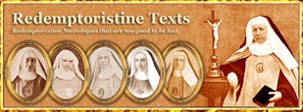
.jpg)









